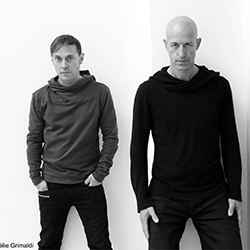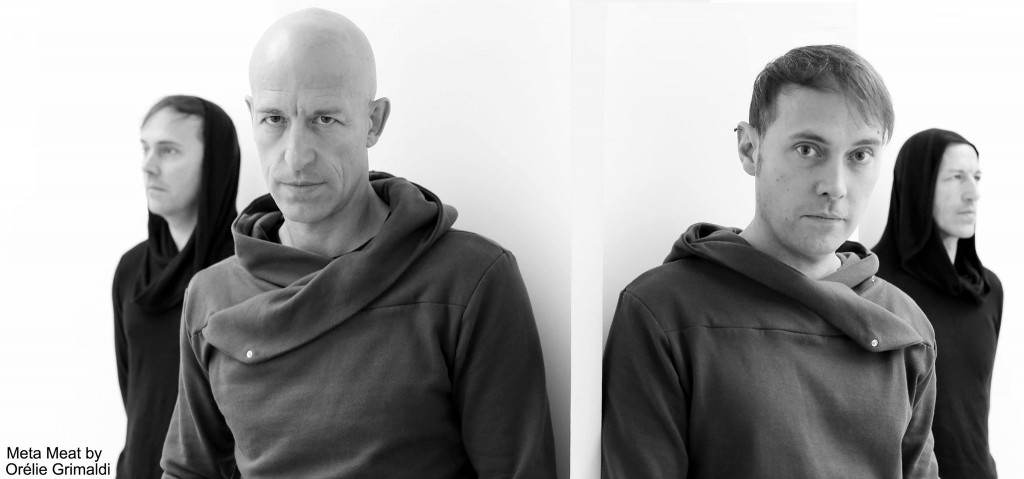Published by Davide Pappalardo on December 2, 2017
 Philip Von and Somekilos of Von Magnet are the duo behind the rhythmic industrial/tribal project Meta Meat, one of the most interesting realities coming from French label Audiotrauma, here in collaboration with Ant-Zen. Their sound is atavistic and at the same time modern, enriched by a theatrical approach which dominates their incredible live performances. We have already reviewed their self-titled debut album, and now we interviewed them about their music, the ideas behind it, their roots, and their future.
Philip Von and Somekilos of Von Magnet are the duo behind the rhythmic industrial/tribal project Meta Meat, one of the most interesting realities coming from French label Audiotrauma, here in collaboration with Ant-Zen. Their sound is atavistic and at the same time modern, enriched by a theatrical approach which dominates their incredible live performances. We have already reviewed their self-titled debut album, and now we interviewed them about their music, the ideas behind it, their roots, and their future.
Hi! Thank you very much for the opportunity to interview you on our website. First of all, I would like to ask you about Meta Meat: how was the project born?
Phil Von: Somekilos and I are both members of Von Magnet. After working together for a few years with that project, sharing a similar approach to music making and live performance; we knew we had a strong potential as a duo, so we decided to join forces and launch a common project.
Somekilos: As a small anecdote, from the moment we agreed to start a new project together, I contacted Gandy, the organizer of the Elektroanschlag Festival in East-Germany, telling him simply: “I have nothing to let you listen to or to show you but you already know our respective projects and what we are worth, then if you want we could play for your next event!” and He said “Yes!”. From that point, we had 6 months to start creating music and a live performance. We had quite short time but Meta Meat was well and truly launched.
Your first album Metameat shows us a really interesting usage of rhythms, giving us both distortions and heavy moments and ritualistic, tribal-like structures. A world where the past and the future collide in a new form of music which retains an atavistic but modern feeling; was it your intention from the beginning? What did you want to conceive?
PV: Bearing in mind the power of our rhythmical skills brought together (Somekilos beating drums and I stamping), we had the desire to explore that primal, warm & direct dialogue. Then, as composers, we needed to imagine a sonic world around us, so we pictured a very electronic setting, colder, dark, haunted which could challenge our raw acoustic energies. We are all composite beings and although we are doing our best to fit in this new technological virtual world, pretending to become almost “neuronic” machines ourselves, we do remain animals as well as souls inhabited by ancient spirits & ancestors which we tend to somehow bury. That’s when we came up with the name Meta Meat, anagram which symbolises that duality. The ritualistic element is crucial in Meta Meat, nothing is banal or trivial, we are seeking for the essential pulse and the tension which are needed to carry out a rite through the intensity of rhythm. I worked with Gnawa tribe in Morocco for 6 months so I can relate to that in my flesh. Some of the samples we use in our music remind us of all the destruction the Western world committed towards so-called “primitive” native people, and by summoning those traditional sounds and voices, we somehow recall and give presence to those “beaten” ones.
Your album was published as a collaboration between Ant-Zen and Audiotrauma, the first one a very important label in the field of rhythmic noise, the second one a relatively new and promising reality already full of very interesting projects with an unorthodox approach toward alternative electronic music. Can you tell us more about it?
SK: Von Magnet and 2kilos & More (Somekilos project) were already signed on Ant-Zen so it was quite obvious for us to remain committed to this great label. Audiotrauma saw our very first live show and being totally blown away by the performance they insisted to co-produce the album and to be involved with the starting of our project. This is a great opportunity for us as it gives us a double chance to be heard and seen.
What’s your approach to songwriting?
PV: Quite bizarre but actually very effective. As we both live in different countries we need to communicate via internet. Generally we work step by step, back and forth. The process is simple, one of us sends an idea or a basic sketch which the other one complements or transforms, then he sends it back, etc… Like an expanding boomerang effect. That’s how the compositions evolves. Later when the pieces are defined as such (at least electronically), we meet up to bring them “alive”, adding up acoustic instruments so to prepare them for the stage. After a few months, enough time for the live performing to alter, sculpt, enrich and strengthen the work, we then decide whether they are ready to be mixed and produced in studio.
Tell us about your influences, both musical, cultural, and so on. What are your roots?
PV: When I was an adolescent, I was a Beatles fan. They taught me to open my ears to all sorts of musical ventures. So being hungry & curious, I listened to everything really, then later as I was living in London, I became quite fascinated by the experimental, provocative and arty theatrical side of music so I embraced the early post-industrial current as well as followed the different early electronic & electro-acoustic music genres. As a flamenco dancer I became obviously a Flamenco music lover and further was inspired by Sufi, Oriental and Turkish music. As for today I must admit I tend to seek for genuine sincerity and poetry within the mass music production.
SK: Okay let’s go, I must not be ashamed, my real two first musical revelations were Indochine and U2 which enabled me to discover the new-wave with New Order and a little bit later Joy Division (which still today remains my favorite band ever). Then the Gothic and especially the French cold-wave scene (Asylum Party…) and at the same time the industrial movement (I’m still a huge fan of the early bands such as SPK, Einstürzende Neubauten, Coil, Brume, Zoviet*France…). A short time later I discovered the techno music in the first rave-parties in Paris. The 90’s electronica remains my favorite electronic music, Autechre, Pan Sonic, the label Raster-Noton… and of course not forgetting the noisy-pop of My Bloody Valentine or Stereolab, the experimental rock/no-wave/post-rock… of This Heat, Birthday Party, Swans, Bästard and many more…
Let’s get technical: what about your equipment? Do you have preferences about instruments and gears to use while doing your music?
PV: I am personally quite picky regarding my few acoustic instruments (Zurna, Duduk, Bendhir, Daf), it is quite difficult to find the right instruments in Western Europe and those are quite fragile and they need some special care and practice to get the right sound. As for machines, I use any tool at my disposal. My main platform is Cubase but I create, sample and treat sounds with any available softwares, plug-ins, virtual synths, incidents, field recorder.
SK: On stage, I play on a drum-set which only consist of different toms and cymbals (and some little percussions). In the middle-term I want to develop this tribal side of our performances and add even more big percussions. Regarding the electronics, I compose and play live with Ableton and some controllers.
Your live performances are very intense and quite powerful, during them you have a very physical approach close to a theatrical representation, or a ritual if you want. How do you live your concerts? Is the live dimension something more for you and your music?
PV: Somekilos is a drummer but with Meta Meat he is actually playing standing up, an approach of percussion which gives him a very powerful physical impact and presence. Being also a dancer I cannot imagine being on stage without expressing some of my feelings through movement and physicality. So yes Meta Meat is definitely worth experiencing live, that’s our true playground which will reveal who we really are, much more demanding & rewarding than the composing studio.
Is there in the modern electronic / industrial / experimental / whatever scene any new act you are following and that you would like to recommend to our readers?
PV: I discovered live a Greek lady called Zinovia, she was astounding. Also on Internet a Russian lady called Mirum Mulier. I love the refined, harmonic, experimental and sensitive quality which women bring to electronic music writing.
SK: The “true” industrial scene is not really dead yet  I like the Australian band Kollaps and also what Sightings did few years ago (for the labels Brah, Our Mouth or Dais). I’m pleased that Mick Harris is back with his new project Fret (even though, as usual with him, an entire album is not so easy to “digest”). But at the moment, I particularly like some noise-rock stuff like YC-CY from Switzerland (the great album Todestanz), Idles, Metz, Unsane (even if they are always doing a little bit the same album again and again) or something more no-wave/cold-wave such as Girls Pissing On Girls Pissing from New-Zealand.
I like the Australian band Kollaps and also what Sightings did few years ago (for the labels Brah, Our Mouth or Dais). I’m pleased that Mick Harris is back with his new project Fret (even though, as usual with him, an entire album is not so easy to “digest”). But at the moment, I particularly like some noise-rock stuff like YC-CY from Switzerland (the great album Todestanz), Idles, Metz, Unsane (even if they are always doing a little bit the same album again and again) or something more no-wave/cold-wave such as Girls Pissing On Girls Pissing from New-Zealand.
Let’s talk about the future: do you have anything new planned at the moment?
SK: We will start writing new pieces which will lead eventually to the making of a new album. But in the meantime we are still hungry to go on stage to explore the repertoire of our first album and we are ready to go on tour again in 2018. We plan to go to Italy for few gigs before next summer, touring in France in March, later in Germany, Lithuania, Portugal…
Thank you again for your time, anything you would like to say to our readers?
PV: If possible try to dive into the music you love or you wish to discover. So listen to good quality music files (no MP3s please) on good Hi-Fi systems or with excellent neutral headphones. That’s how you will perceive all the colours, the frequencies, the subtlety and basically the efforts which musicians put into high quality music production… just for you listeners.
HV: Do what Phil just said before! 


